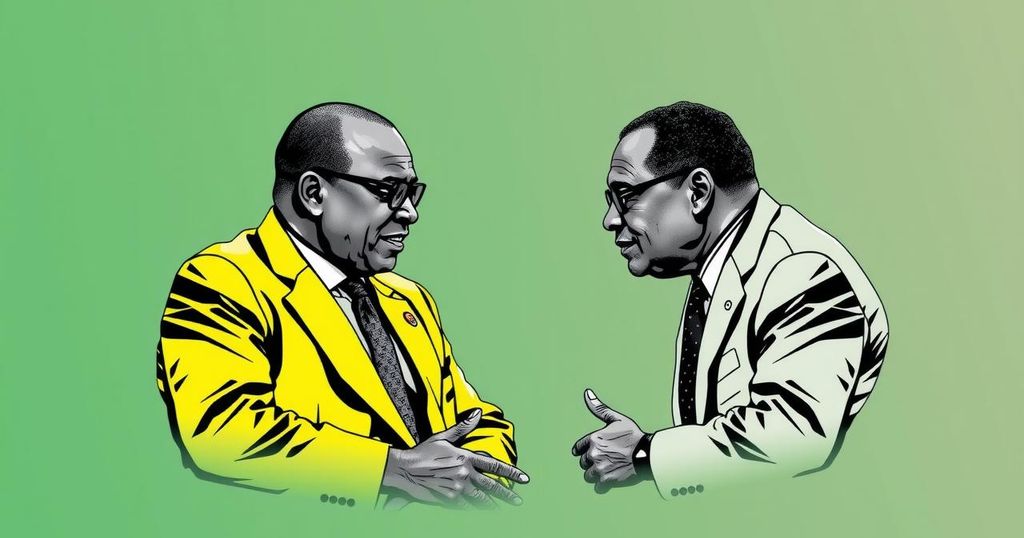Mozambique President Calls for Dialogue to Address Post-Election Unrest
Mozambican President Filipe Nyusi has proposed dialogue with the four presidential candidates to address unrest following the October 9 elections, where the ruling party’s victory is contested. The unrest has led to fatalities and economic strain, with President Nyusi emphasizing the need for unity and collaboration to restore peace. Critics question the sincerity of the dialogue amidst ongoing legal actions against opposition leaders, while the upcoming inauguration of winning candidate Daniel Chapo adds urgency to the situation.
In his recent state of the nation address, outgoing President Filipe Nyusi of Mozambique extended an invitation to the four presidential candidates to engage in dialogue aimed at resolving the ongoing unrest following the contested elections of October 9. President Nyusi acknowledged the unrest has resulted in numerous fatalities and injuries, as protesters allege that the victory of the ruling Frelimo party’s candidate, Daniel Chapo, was secured through fraudulent means, a claim that the government denies. President Nyusi highlighted the detrimental impact of the unrest on the economy, which has led to decreased business activity and rising unemployment rates. He expressed a commitment to restore peace in Mozambique before the conclusion of his presidency, emphasizing the necessity for unity among all citizens to address the pressing issues facing the nation. His hope is that constructive discussions with the candidates, particularly in light of a divided electorate, could foster solutions for the public good. The post-election violence has claimed at least 30 lives, sparking further protests called by Venancio Mondlane, the independent candidate who finished second in the election. He vocally challenged the results, which state officials claim show Chapo won with over 60% of the votes. Moreover, the Attorney General’s Office has initiated legal action against Mondlane and his party for damages incurred during the protests, complicating the atmosphere of dialogue the president seeks. Criticism of President Nyusi’s overtures has emerged from human rights advocate Adriano Nuvunga, who suspects insincerity in the proposed talks. He argued that the president’s attempts to induce dialogue appear undermined by ongoing legal actions against opposition figures and a refusal to address protestors’ concerns adequately. Conversely, Methodist Bishop Dinis Matsolo asserted that dialogue represents a vital path toward restoring stability, stressing that transparent electoral processes are critical for national peace. As President Chapo prepares for his inauguration in January, no candidates have yet accepted the invitation to engage in dialogue. The events unfolding in Mozambique illustrate a critical moment as the nation grapples with the implications of recent elections and the urgent need for reconciliation amidst ongoing tensions and dissatisfaction from a significant portion of the populace.
The unrest in Mozambique follows the October 9 election, where ruling party candidate Daniel Chapo was declared the winner in a competitive and contentious environment. Allegations of electoral fraud have incited mass protests and widespread dissatisfaction among various groups, particularly highlighted by independent candidate Venancio Mondlane. Amidst fears of economic decline and rising violence, President Nyusi’s call for dialogue aims to quell tensions and stabilize the nation, while various stakeholders express skepticism regarding the sincerity and effectiveness of such discussions.
In conclusion, President Filipe Nyusi’s call for dialogue with presidential candidates highlights the urgent need to address the aftermath of Mozambique’s controversial elections. The ongoing unrest—marked by significant loss of life and injuries—underscores the vitality of open discourse to resolve the discrepancies and grievances raised by the protests. As the nation faces pressing economic challenges and societal unrest, the response from opposition candidates will be critical in shaping the future course of Mozambique’s political landscape.
Original Source: www.voanews.com




Post Comment